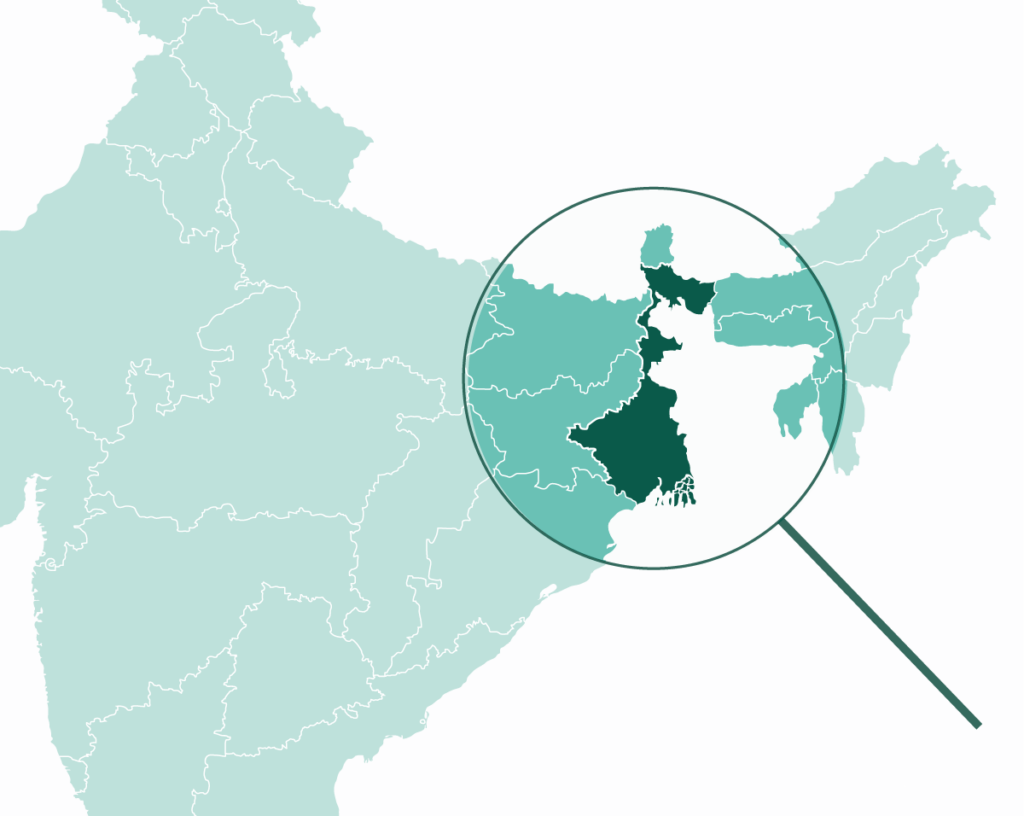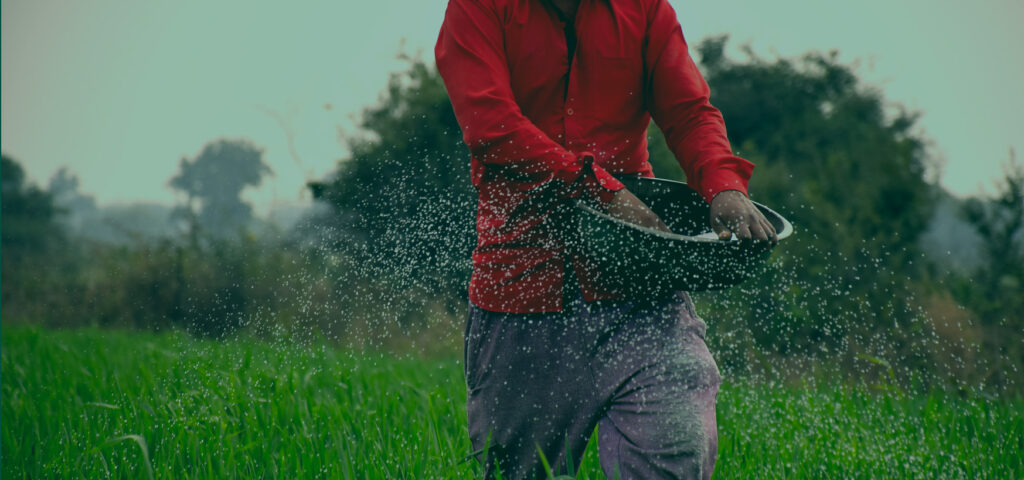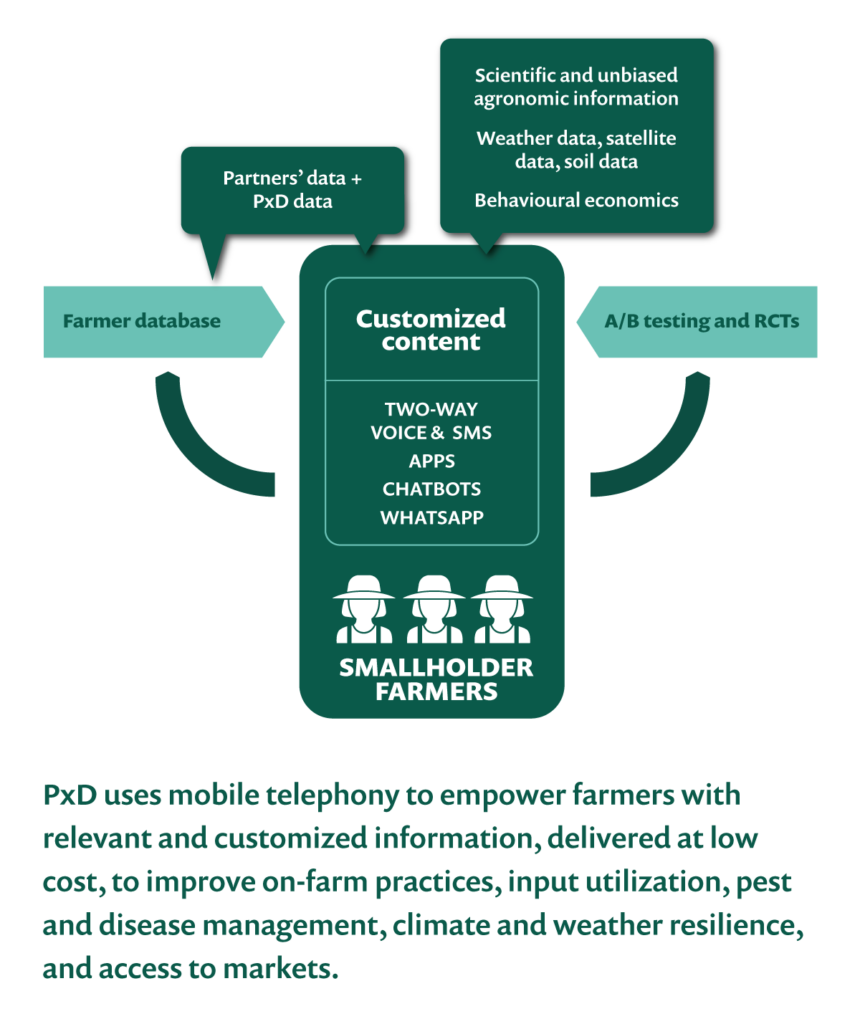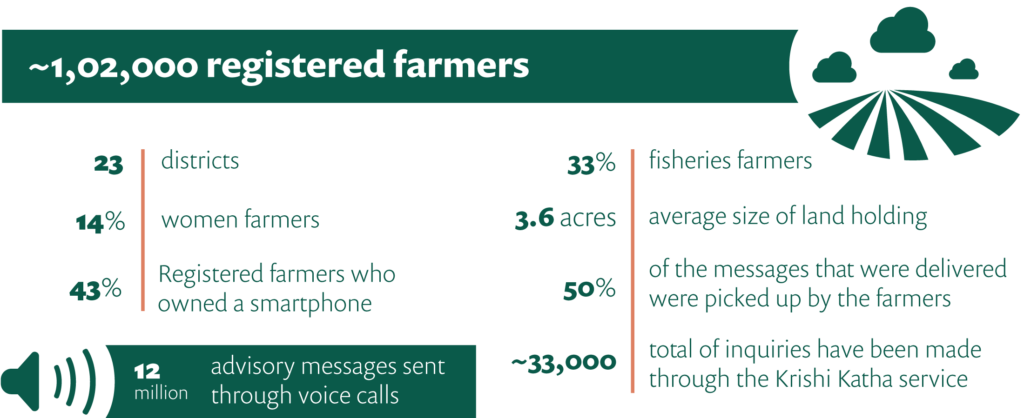
West Bengal is the 6th largest economy in India, located on the Eastern Seaboard. Its capital city, Kolkata, is the cultural capital of India and is called the ‘City of Joy’ after its soulful embodiment of traditions, literature, history, food, and much more.
Approximately 7 million families from the state are engaged in agriculture, 96% of whom are marginal and smallholder farmers (those operating on less than 2 hectares of land). The state is the largest producer of rice and vegetables and the second-largest producer of potatoes, tea, and fish.
Though agriculture serves as the backbone of its economy, farmers in the state are exposed to an array of challenges like poor crop productivity, land fragmentation, poor soil quality, labor issues, and lack of access to credit, storage and markets. Another major challenge is the lack of adequate irrigation infrastructure. Two-thirds of the cropped area is still dependent on the monsoon, which is uncertain and unreliable, especially with the evolving climate crisis.
The rapid spread of mobile phones engaging 55.6% of West Bengal’s rural population offers a unique opportunity to provide real-time, dynamic information to smallholder farmers in a targeted, low-cost, and scalable manner; thus helping farmers address the growing challenges they are facing.
In this blog, we discuss our journey of ideating and implementing a tech-enabled digital advisory solution named ‘Krishi Katha’ to cater to the low crop productivity issues among small and marginal farmers in West Bengal.

Ideation of the Krishi Katha service
Farmers in West Bengal (mainly marginal and smallholders) lack proper irrigation facilities, leaving them vulnerable to crop failures during extreme weather. This issue isn’t limited to the fields; it’s a threat to the state’s economic growth.
The state is a major contributor to ensuring food security and is already seeing reduced yields and higher food prices due to water shortages. The absence of efficient irrigation infrastructure further perpetuates this cycle of low productivity.
To address these issues, the World Bank and the Department of Water Resources on the West Bengal Accelerated Department of Minor Irrigation Project (WB ADMI) began a collaboration to improve agricultural productivity through small-scale irrigation structures and community-based irrigation.
The goal of this collaboration was to ensure equitable access to irrigation and strengthen smallholder farmer incomes by diversifying into agriculture, horticulture, and fisheries. As part of this project, PxD implemented its 24*7, proactive (acting in anticipation of future needs), two-way, Interactive Voice Response (IVR) based advisory service, Krishi Katha, to provide support to smallholder farmers associated with Water User Associations (WUAs) with practices related to agriculture and related sectors.
Award-winning Krishi Katha – The model and scope of the service

Krishi Katha was recently awarded first runner-up in the E-agriculture category of the World Summit on the Information Societies Prizes (WSIS) 2023, and here we share more about the progress of the program.
Precision Development (PxD) has successfully provided customized and evidence-based advice to over 100,000 farmers in 23 districts of West Bengal through Krishi Katha. The project started in May 2019, with the project operations transitioned to the WBADMI project in December 2021. PxD continues to be in a software licensing and maintenance agreement with the government.
This service has been delivering timely information on crop and irrigation management as well as fisheries in local languages. By optimizing the alignment between agricultural decisions and irrigation use, PxD aimed to strengthen the department’s extension machinery in improving farmers’ knowledge and skills, providing technical advice and information, building farmer communities, and enabling behavior change, to augment agriculture-based livelihoods.
Farmers receive 2-3 voice calls per week with advisory messages tailored to their crop/fish and weather cycles as part of the outbound service. The inbound service allows farmers to give a missed call and access a toll-free helpline to ask questions, review previous weekly advisory messages, listen to frequently asked questions from other farmers, and access their own history of questions.
Following the successful completion of the pilot in 10 districts by October 2019, the project was scaled up to the entire state across 23 districts.
Agricultural advisory inbound services provided by the government or private players are mostly based on live call interactions of experts with farmers. Though this provides a user-friendly experience, it has a few limitations: limited interaction tenure (during office hours), a longer waiting period time during peak times, pressure on the expert to respond instantly and on the farmer to understand and document/remember the response, uncertainty of receiving a response when the expert wishes to call back later with a response. Due to a lack of farmer’s agricultural information, the relevance of outbound advisory services is often compromised leading to farmers being spammed with generic advisory content.

Krishi Katha circumvents such challenges with its relevant, on-time, and customizable advisory service. Recording and updating farmer data helps us create advisory content specific to their agricultural needs and undertake research activities to improve the service. The two-way IVR service enables:
- farmers to record their questions 24*7, revisit their stored Q&A in their personal inbox, and access FAQs by other nearby farmers whenever they need, thus eliminating the need to memorize the responses they’ve received.
- experts to take sufficient time to curate the best response, unlike in a live call setup, and reduce the response time significantly for a repeat question by forwarding the response audio from their digital directory.
Partnering with the WBADMI project further helps us with community mobilization and awareness, capacity building and promoting trust among the target farmers.

Tackling Challenges: Turning Learning into Action
In the pursuit of enhancing crop productivity and promoting rural livelihoods, Krishi Katha encountered a spectrum of challenges that shaped the project's effectiveness. A few are highlighted below
- Limited digital literacy: We discovered that while our technology was user-friendly, a bit of initial guidance was necessary for optimal use, among marginal and smallholder farmers. This insight drove us to implement our phygital training model (fusion of physical and digital training). We collaborated closely with our government partners to enhance the capacity of their field extension system, offering training to farmers both in person and remotely. Our efforts have proven instrumental in bridging the knowledge gap effectively.
- Delayed farmer onboarding: Our reliance on obtaining active phone numbers from the government led to unforeseen bottlenecks. The process of collecting these numbers from the field in small batches caused delays. When we received large batches of numbers, the data quality diminished, making it challenging to filter and onboard active farmers after profiling. Initially, we assumed a seamless flow of active phone numbers but realized we needed to recalibrate our approach. We reallocated resources to collaborate more closely with government field teams, ensuring the procurement of high-quality farmer contact data.
These experiences have taught us the importance of flexibility and adaptation in the face of challenges. We're continuously evolving our approach to better serve farmers and maximize the impact of our initiatives.
Service transition and the way forward
The journey of Krishi Katha is a tale of growth, with its farmer base now encompassing approximately 100,000 farmers. After 2 and a half years since its inception, the project successfully transitioned service operations to the capable ADMI team. Our transition training covered agronomy management, data handling, call center operations, and process streamlining, exemplifying our commitment to knowledge transfer and sustainability of operations.
Now, PxD’s role has shifted to support. We focus on server maintenance, systematic data backup, and vigilant technology monitoring. This journey – from inception, through operational management, to government handover – has enriched us with invaluable experience which positions us for future projects to serve farmers alongside public partners.
PxD is now approaching state departments working in the agriculture and allied space to extend the Krishi Katha service to all farmers in West Bengal.